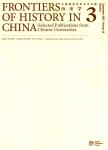Did the Nationalist Government Manipulate the Chinese Bond Market? A Quantitative Perspective on Short-Term Price Fluctuations of Domestic Government Bonds, 1932-1934
Did the Nationalist Government Manipulate the Chinese Bond Market? A Quantitative Perspective on Short-Term Price Fluctuations of Domestic Government Bonds, 1932-1934作者机构:School of History Classics and Archaeology University of Edinburgh Edinburgh EH10 6AJUK Biophysical Sciences Graduate Program Institute for Biophysical Dynamics The University ofChicago Chicago IL 60615 USA
出 版 物:《Frontiers of History in China》 (中国历史学前沿(英文版))
年 卷 期:2015年第10卷第1期
页 面:126-144页
学科分类:0303[法学-社会学] 12[管理学] 0304[法学-民族学] 02[经济学] 0202[经济学-应用经济学] 03[法学] 1201[管理学-管理科学与工程(可授管理学、工学学位)] 030401[法学-民族学] 020204[经济学-金融学(含∶保险学)] 0603[历史学-世界史]
主 题:bond markets Guomindang financial history quantitative methods
摘 要:Based on a newly constructed set of data, this paper offers a quantitative perspective on the Nationalist Government's relations with China's domestic bond markets during the period 1932-34. For all the recent revisionist scholarship on the achievements of Nationalist state-building, the perception of the Nationalist elite as corrupt is still widely accepted. In order to demonstrate the empirical potential of quantitative financial history, this paper tests one particular assertion: that members of the Nationalist elite manipulated the issue price of domestic government bonds in order to enrich themselves and their associates. We test this by calculating two price data correlations: that of a first sample of government bonds, all of them issued before 1932, and that of a second sample of government bonds, which includes bonds issued during the period under review. The price fluctuations of the first sample are correlated with each other to a much higher degree than those of the second sample. This indicates that the prices of bonds in the first sample were reacting similarly to the same range of influences, while the bonds issued during the period under review and included in the second sample were displaying individual price fluctuations. One possible explanation for this is that members of the Nationalist elite enriched themselves or their associates by issuing domestic government bonds at artificially low prices. In sum, the article illustrates both the potential and the limitations of quantitative history: it allows us to test and dismiss a precisely formulated hypothesis about Nationalist corruption, but it is only one possible way in which statistical analysis can be applied and does not cover the wholeDid the Nationalist Government Manipulate the Chinese Bond Market? realm of state practices



